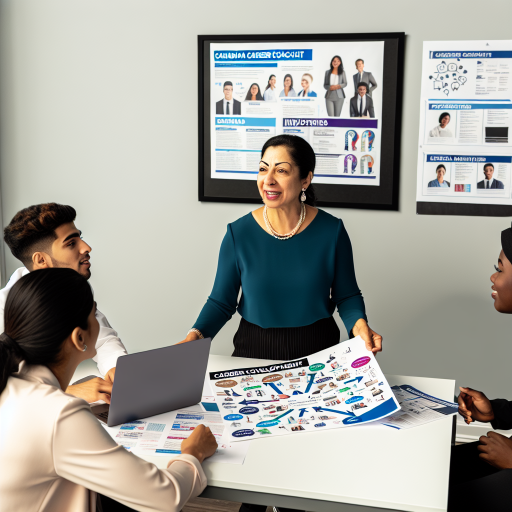Overview of Youth Programs in Canadian Communities
Definition and Purpose
Youth programs in Canada serve to empower young individuals.
These initiatives promote personal and social development.
Additionally, they aim to foster community engagement.
Participants gain valuable skills and experiences.
Diverse Program Types
Various types of youth programs exist across Canada.
Sports programs encourage physical health and teamwork.
Arts initiatives nurture creativity and self-expression.
Leadership programs develop essential management skills.
Moreover, mentorship programs provide guidance and support.
Community Collaboration
Many youth programs thrive on community partnerships.
Local organizations often collaborate with schools and businesses.
This collaboration enhances the resources and support available.
Community involvement creates a supportive network for youth.
Accessibility and Inclusivity
Ensuring accessibility is vital for youth programs.
Many initiatives strive to be inclusive of all backgrounds.
Efforts focus on providing programs regardless of socioeconomic status.
Language and cultural adaptations strengthen participation.
Impact on Participants
Engagement in youth programs leads to positive outcomes.
Participants often report higher self-esteem and confidence levels.
They also develop critical thinking and problem-solving skills.
Furthermore, youth programs cultivate a sense of belonging.
Evaluation and Continuous Improvement
Many programs undergo regular assessments for effectiveness.
Feedback from participants helps shape future initiatives.
Continuous improvement ensures programs meet evolving needs.
This process strengthens overall youth program impact.
Unlock Your Career Potential
Visualize a clear path to success with our tailored Career Consulting service. Personalized insights in just 1-3 days.
Get StartedRole of Facilitators in Youth Programs
Definitions and Responsibilities
Youth program facilitators play a crucial role in the development of young individuals.
They guide and support participants throughout various activities.
Facilitators also create a safe and inclusive environment for all youth.
They help foster personal growth and community involvement.
Additionally, they work to enhance social skills and promote teamwork.
Key Responsibilities
Facilitators have several essential responsibilities within youth programs.
First, they are responsible for planning engaging activities.
Next, they assess the needs of participants to tailor programs accordingly.
Moreover, they monitor group dynamics to ensure positive interactions.
Facilitators also lead discussions that encourage youth expression.
They provide feedback and guidance to help individuals improve their skills.
Collaboration with Other Stakeholders
Facilitators often collaborate with various stakeholders in the community.
They work jointly with schools to enhance student experiences.
Furthermore, they connect with parents to ensure program success.
They may also partner with local organizations to expand resources.
This collaboration ensures that programs meet the community’s needs.
Impact on Youth Development
The positive impact of facilitators extends to youth development outcomes.
Through effective guidance, participants become more self-confident.
They also develop critical thinking and problem-solving abilities.
Moreover, facilitators inspire community activism among youth.
This guidance promotes a sense of belonging and responsibility.
Positive Impacts of Youth Program Facilitators on Youth Development
Fostering Skills and Competencies
Youth program facilitators play a vital role in developing skills among young people.
They provide training in leadership, teamwork, and problem-solving.
Moreover, these programs enhance communication and interpersonal skills.
Consequently, youth become more equipped for future challenges.
Boosting Self-Esteem and Confidence
Facilitators help boost the self-esteem of young participants.
Engaging in various activities promotes a sense of accomplishment.
This newfound confidence positively impacts their overall well-being.
As a result, youth feel more empowered to pursue their goals.
Enhancing Community Engagement
Through these programs, facilitators encourage community involvement.
Youth learn the importance of giving back to their communities.
Participating in local events and projects fosters a sense of belonging.
This civic engagement helps strengthen community ties.
Reducing Risky Behaviors
Facilitators play a key role in mitigating risky behaviors among youth.
Participating in structured programs keeps young people engaged.
This engagement decreases the likelihood of substance abuse or delinquency.
In addition, positive role models inspire healthier choices.
Promoting Mental Health and Well-Being
Facilitators support mental health initiatives in their programs.
They create safe spaces for youth to express their feelings.
This supportive environment reduces anxiety and depression rates.
Consequently, young people develop resilience and coping skills.
Encouraging Lifelong Learning
Facilitators inspire a passion for lifelong learning among participants.
They introduce new ideas and experiences that broaden perspectives.
This love for learning enhances academic performance.
Additionally, it prepares youth for continuous personal and professional growth.
You Might Also Like: Day-to-Day Life of a Youth Program Facilitator
Community Engagement Strategies Utilized by Youth Program Facilitators
Building Trust and Relationships
Youth program facilitators prioritize building trust in their communities.
They engage with young people through open and honest communication.
Additionally, they invite feedback to create an inclusive environment.
Trust fosters a sense of belonging among participants.
Consequently, this enhances program effectiveness and participation rates.
Utilizing Collaborative Partnerships
Youth program facilitators actively seek partnerships with local organizations.
They collaborate with schools, community centers, and non-profits.
Such partnerships expand resources and outreach capabilities.
Moreover, they help leverage community expertise and networks.
These collaborations enrich the program experience for youth participants.
Implementing Skill-Building Workshops
Skill-building workshops form a core component of youth programs.
Facilitators design activities based on participants’ interests and needs.
Workshops cover various topics such as leadership, conflict resolution, and teamwork.
These skills empower youth to navigate challenges in their communities.
As a result, participants feel more capable and confident.
Creating Safe Spaces for Expression
Facilitators establish safe spaces for youth to express themselves.
These spaces encourage open dialogue and creative expression.
Youth can share their thoughts, experiences, and aspirations.
Furthermore, this promotes emotional well-being and community connections.
Facilitators listen actively to ensure every voice is heard.
Engaging in Community Service Projects
Community service projects provide hands-on engagement for youth.
Facilitators involve participants in local initiatives and volunteering efforts.
These projects foster a sense of responsibility and pride.
Youth learn the importance of giving back to their community.
Consequently, they develop a deeper connection to their surroundings.
Using Technology for Broader Outreach
Many facilitators leverage technology to connect with youth.
They utilize social media and online platforms for outreach and communication.
This approach ensures they reach diverse groups of young people.
Additionally, technology facilitates sharing valuable resources and information.
Ultimately, it enhances overall program participation.
Find Out More: Key Benefits of Hiring a Career Coach in Canada
Challenges Faced by Youth Program Facilitators in Canadian Communities
Resource Limitations
Youth program facilitators often struggle with limited funding.
This lack of financial support restricts the range of programs they can offer.
As a result, facilitators might have to cut essential services.
They frequently seek additional grants to support their initiatives.
However, applying for grants requires significant time and expertise.
Workforce Shortages
Many communities face a shortage of qualified youth workers.
This imbalance creates heightened workloads for existing staff.
Facilitators may experience burnout due to these increased demands.
Furthermore, it can impact the quality of programs delivered.
Often, facilitators must take on multiple roles to meet community needs.
Cultural and Linguistic Diversity
Canadian communities are diverse, which presents unique challenges.
Facilitators strive to ensure inclusivity across various cultural backgrounds.
They often face language barriers that impede effective communication.
Therefore, understanding cultural nuances is crucial for success.
Facilitators frequently engage in cultural competence training.
Engagement and Outreach Issues
Engaging youth in programs can be daunting.
Facilitators must continuously innovate to capture interest.
Social media strategies are increasingly important for outreach efforts.
Moreover, the impact of online distractions cannot be overlooked.
Facilitators often organize community events to boost participation.
Measuring Program Impact
Assessing the effectiveness of youth programs is challenging.
Facilitators seek robust metrics for evaluation, but these are often lacking.
They need accessible tools to measure outcomes effectively.
Program feedback from participants helps but may be inconsistent.
Facilitators utilize qualitative methods to gather insights as well.
Find Out More: Youth Program Facilitator Salary Insights in Canada

Case Studies: Successful Youth Programs and Their Facilitators
Empowerment Through Leadership
One notable program, the Youth Leadership Initiative, fosters leadership skills among young Canadians.
This program trains facilitators like Sarah Mitchell, who inspires youth to engage in their communities.
Mitchell emphasizes the importance of collaboration and communication in her workshops.
As a result, participants develop critical thinking and problem-solving abilities.
Moreover, they gain confidence to tackle community issues effectively.
Creative Expressions Program
The Creative Expressions Program, led by David Tran, highlights the power of art in youth development.
Tran encourages participants to explore their creativity and express themselves through various mediums.
This program builds self-esteem and promotes emotional well-being among youth.
Furthermore, it fosters a sense of belonging within the community.
STEM for Future Innovators
Another impactful initiative is the STEM for Future Innovators program.
Facilitators like Emily Chen engage students in fun, hands-on science and technology activities.
Chen’s dynamic approach makes STEM subjects accessible and enjoyable.
Consequently, participants develop a passion for science and technology careers.
Additionally, this program encourages teamwork and collaboration among peers.
Sports as a Platform for Growth
The Youth Sports Development Program aims to promote physical fitness and teamwork.
Facilitator James Roberts designs activities that build athletic skills while emphasizing cooperation.
Participants learn essential life skills, such as discipline and perseverance.
Roberts believes that sports can serve as a powerful tool for personal growth.
Furthermore, he fosters a supportive environment that encourages inclusivity.
Integrating Community Service
The Community Service Leaders program encourages youth to give back to their communities.
Liam O’Connor, a passionate facilitator, mentors participants in various service projects.
O’Connor highlights the significance of empathy and social responsibility.
This initiative cultivates a spirit of volunteerism among young people.
As a result, participants develop a deeper connection to their communities.
Gain More Insights: Challenges Faced by Early Childhood Educators and Solutions
Long-term Effects of Youth Programs on Community Cohesion and Development
Building Stronger Community Bonds
Youth programs foster connections between participants from diverse backgrounds.
They encourage the understanding and respect of various cultures.
Furthermore, these programs promote teamwork and collaboration among youth.
As a result, young individuals develop strong relationships in their communities.
Encouraging Civic Engagement
Participants in youth programs often become active community members.
They learn the importance of civic responsibility from a young age.
This engagement can lead to higher voter turnout in their later years.
Moreover, young people often advocate for local issues they are passionate about.
Supporting Personal Development
These programs provide valuable life skills to participants.
For instance, they enhance leadership and communication abilities.
Additionally, youth programs teach conflict resolution and problem-solving skills.
Consequently, participants gain confidence and self-esteem.
Stimulating Economic Growth
Youth programs contribute to local economies in various ways.
They create job opportunities through programming and events.
Local businesses often benefit from increased youth participation.
This economic stimulation helps foster a thriving community.
Reducing Youth Crime and Anti-social Behavior
Participating in structured activities helps reduce youth crime rates.
These programs provide a positive outlet for energy and creativity.
Additionally, they offer mentorship and guidance from positive role models.
Ultimately, engaged youth are less likely to engage in anti-social behavior.
Policy Recommendations for Supporting Youth Program Facilitators
Enhancing Training Opportunities
Training opportunities are essential for youth program facilitators.
Programs should focus on skill development and leadership training.
Facilitators need access to workshops and seminars regularly.
Moreover, these training sessions should include best practices in youth engagement.
Increasing Funding and Resources
Increased funding can significantly enhance program effectiveness.
Local governments should allocate more resources for youth programs.
Additionally, grants should be available to support facilitator initiatives.
Funds can also cover materials and activities that engage youth directly.
Promoting Collaboration Among Organizations
Collaboration among community organizations enhances program reach.
Facilitators can share resources and insights to improve effectiveness.
Joint initiatives can unite various stakeholders for common goals.
Networking events should be organized to foster these partnerships.
Implementing Supportive Policies
Policymakers should prioritize the development of supportive policies.
These policies should aim to protect the rights of youth and facilitators.
Furthermore, they should encourage inclusivity and diversity in programming.
Encouraging Volunteer Participation
Volunteer support can strengthen youth programs significantly.
Initiatives should engage local volunteers to assist facilitators.
Training for volunteers can enhance their skills in youth programming.
Recognition programs for volunteers will motivate continued involvement.
Evaluating Program Impact
Regular program evaluation is crucial to ensure effectiveness.
Facilitators should track youth engagement and satisfaction rates.
This evaluation will guide future improvements and adaptations.
Feedback mechanisms can also be established for actionable insights.
Additional Resources
Evidence-Based Interventions for Preventing Substance Use …
Crime Prevention in Indigenous Communities: An Examination of …




